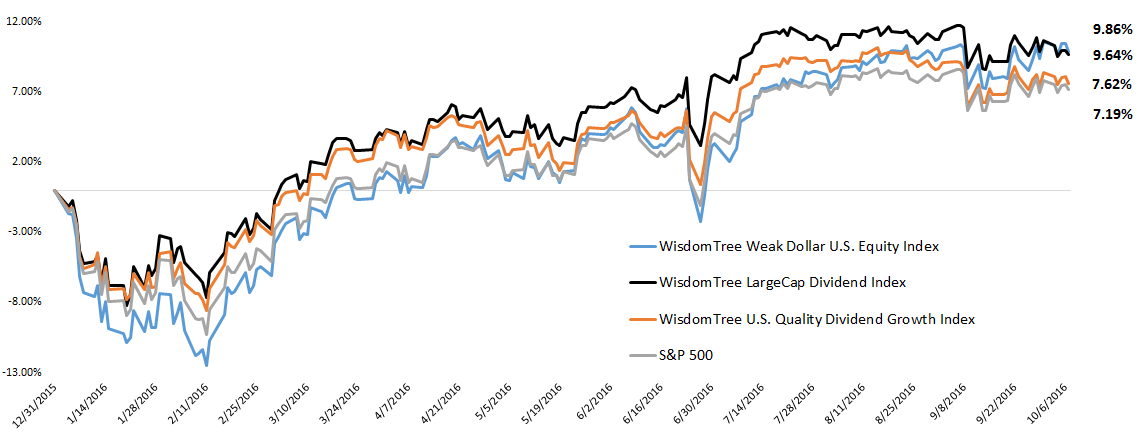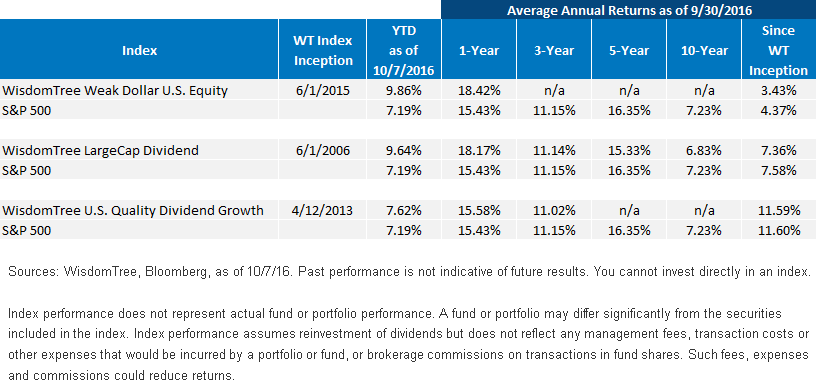Back in August 2015, on the eve of the first Republican primary debate, I wrote about how
the ascent of Donald Trump could impact the political conversation in America. Trump’s experience inside a professional wrestling ring, I argued, would give him a unique advantage inside the political arena. In a few weeks, voters will put an end to what has been the most depressing presidential campaign in our lifetime; shortly thereafter, the nation’s focus will shift from personalities to the legislative priorities of the next president.
Until we know the configuration of Congress, predicting the impact of the U.S. election on the financial markets is premature. I do believe that generally, absent a foreign policy crisis, economic forces and
monetary policy will continue to have a bigger impact on markets than domestic policy. The impact that 535 lawmakers and one president have on the economy is often far less than the economic choices made by 320 million individual Americans. Changes in fiscal, tax, energy, education, health and regulatory policy all matter when measured over years or decades. But in the near term, the next six to 12 months, they have only an indirect impact on the direct inputs that move asset prices:
interest rates, corporate profits, the dollar and the price of oil.
If Clinton Wins
This is another way of saying I believe U.S. equity and bond markets will be impacted more by fundamentals, by central banks and by
what can pass Congress in the next two years than by who wins the election. If Secretary Clinton wins and the Republicans maintain control of at least the House of Representatives, many of her campaign promises will be dead on arrival. We will likely see something similar to a third Obama term with respect to domestic policy—that is, gridlock in Washington on the legislative front, more activism on the regulatory and judicial fronts, tolerance of the status quo with respect to legal and illegal immigration, and continued institutional support for the global trading system and for America’s strategic commitments overseas that help sustain it. That is, I see continued slow growth in
gross domestic product (GDP), stalled productivity and labor participation growth and perhaps another 12 to 18 months left in the current expansion.
If Trump Wins
If Donald Trump wins, I believe the markets in the U.S. and overseas will experience an initial sell-off, as betting odds in mid-October were likely underestimating the chances of a Trump victory. With a President-elect Trump, I think we get greater
volatility in stock and bond markets, if only because there is much greater uncertainty about where the country will be headed—and how it will be governed. So, one takeaway is to be prepared to sell volatility and take advantage of the higher premiums that should result.
Implications for Fiscal Policy
The answer to the question “What impact would Trump or Clinton have on the economy?” comes down to what legislation House speaker Paul Ryan wants to introduce, what he believes can pass the House and Senate and what a new president would ultimately sign. If Trump is elected, I believe the preferred path forward for Speaker Ryan will be broad tax reform that lowers tax rates for individuals and businesses, encourages private investment in the U.S., provides incentives for companies to repatriate foreign profits and, to the extent possible, curbs growth in future entitlement spending. A cut in the corporate tax rate could immediately increase the profits generated by corporate America, which could send stock prices higher. If Secretary Clinton is elected, there is a chance for a smaller fiscal package that could combine additional infrastructure spending with international tax reform that encourages companies to repatriate profits. But a larger budget deal next year that includes tax increases to reduce the federal budget deficit, similar to what President Bill Clinton achieved in 1993, remains unlikely with a Republican House, unless the package is overwhelmingly skewed toward spending cuts.
If the Democrats win back both houses of Congress and Secretary Clinton wins, I believe the U.S. stock market will correct from present levels, discounting the likelihood of new tax hikes in 2017. The more probable outcome is that the Republicans hold at least the House, and therefore a President Clinton will likely be unable to pass the higher tax rates she has proposed on
capital gains, estates, financial transactions, higher incomes and
carried interest. However, bipartisan support may well exist for lowering the corporate tax rate on foreign profits. Such a tax cut would actually incent companies to bring back foreign cash into the U.S. and could be a source of new tax revenue for the federal government. Congressional Democrats could support such a measure, especially if it is coupled with greater infrastructure investment, something Secretary Clinton has advocated. With more than $2 trillion in corporate cash stashed overseas, companies could use such repatriated profits to increase hiring or capital spending, or more likely, to increase
dividend payments and share repurchases.
Playing the Repatriation Trade
Much of that overseas cash is concentrated in U.S. multinational technology, health care, industrial, and global financial companies. Three predominately large-cap exchange-traded funds that provide investors exposure to such multinationals with substantial revenues and profits generated overseas are the
WisdomTree U.S. Quality Dividend Growth Fund (DGRW), the
WisdomTree LargeCap Dividend Fund (DLN) and the
WisdomTree Weak Dollar U.S. Equity Fund (USWD). As one can see from the chart and table below, the underlying WisdomTree Indexes for these Funds have been quietly outperforming the
S&P 500 Index in 2016.
Year-to-Date Cumulative Returns


Click each ticker to view standardized performance for
DGRW,
DLN and
USWD.
Conclusion
Once investor focus shifts to what fiscal measures a new president can pass through the next Congress in 2017, keep an eye on international tax reform that encourages the repatriation of U.S. corporate profits held overseas. Should such tax reform gain speed, be on the lookout for ways to play the “repatriation trade,” which could accelerate the pace of dividend payments and share
buybacks for selected U.S. multinational companies. WisdomTree believes that DGRW, DLN or USWD could provide unique access vehicles to this theme.
Important Risks Related to this Article
There are risks associated with investing, including possible loss of principal. Funds focusing their investments on certain sectors increase their vulnerability to any single economic or regulatory development. This may result in greater share price volatility.
Stocks that previously exhibited a positive correlation in equity performance to a weak U.S. dollar may not do so in the future, which could negatively impact Fund performance.
Dividends are not guaranteed, and a company currently paying dividends may cease paying dividends at any time.
Please read each Fund’s prospectus for specific details regarding each Fund’s risk profile.
Neither WisdomTree Investments, Inc., nor its affiliates, nor Foreside Fund Services, LLC, or its affiliates provide tax advice. All references to tax matters or information provided on this site [in this material] are for illustrative purposes only and should not be considered tax advice and cannot be used for the purpose of avoiding tax penalties. Investors seeking tax advice should consult an independent tax advisor.



 Click each ticker to view standardized performance for DGRW, DLN and USWD.
Conclusion
Once investor focus shifts to what fiscal measures a new president can pass through the next Congress in 2017, keep an eye on international tax reform that encourages the repatriation of U.S. corporate profits held overseas. Should such tax reform gain speed, be on the lookout for ways to play the “repatriation trade,” which could accelerate the pace of dividend payments and share buybacks for selected U.S. multinational companies. WisdomTree believes that DGRW, DLN or USWD could provide unique access vehicles to this theme.
Click each ticker to view standardized performance for DGRW, DLN and USWD.
Conclusion
Once investor focus shifts to what fiscal measures a new president can pass through the next Congress in 2017, keep an eye on international tax reform that encourages the repatriation of U.S. corporate profits held overseas. Should such tax reform gain speed, be on the lookout for ways to play the “repatriation trade,” which could accelerate the pace of dividend payments and share buybacks for selected U.S. multinational companies. WisdomTree believes that DGRW, DLN or USWD could provide unique access vehicles to this theme.


